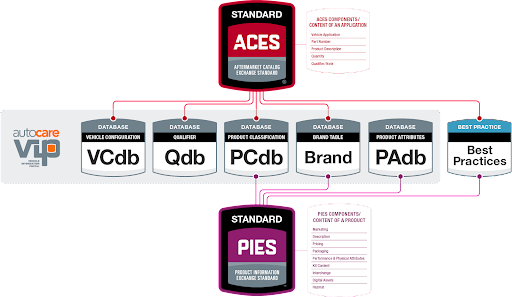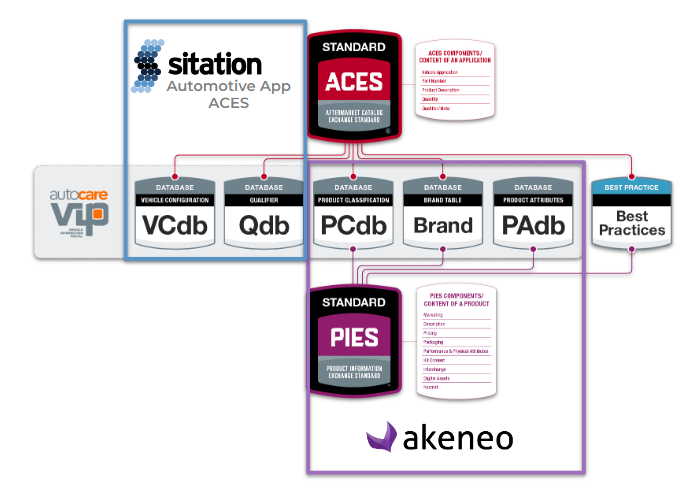Discover the methodology behind automotive regulation policies such as ACES and PIES, and how Akeneo PIM and Sitation's new Automotive App can help in this latest article from Akeneo partner, Sitation.

Keywords
The data standards required to compete today, especially in the automotive industry, require a unique approach that leverages many different types of data. This article will cover an overview of the data required for automotive products, the importance of a microservices approach to managing this data within your commerce system, and the importance of leveraging enriched product data for a compelling experience.
In the automotive industry, fitment is the beginning of personalizing the shopping experience. The consumer will never see the product data, price, or availability if you fail to connect the parts with the consumer's vehicle.
The Autocare Association represents the automotive industry and sets the standards. These standards are commonly referred to as ACES and PIES, but there are several layers of database provided as part of the Autocare VIP service.
ACES stands for Aftermarket Catalog Exchange Standard, and PIES stands for Product Information Exchange Standard. The below chart details the relationship between the various databases and the higher level standards, but most industry professionals use ACES and PIES to discuss the requirements for automotive data.

PIES data covers the core attribution, assets, product makeup, and classification. From a product experience perspective, this data is no different in structure from other products in other industries.
All products need a title, brand, description, price, and some sort of hierarchy. While the specifics of PIES data structures are highly specific and tailored to the automotive industry, they very closely align with what we recognize as core PIM functionality. Completeness, data quality analysis, data validation, and assets are critical pieces of the enrichment of this data.
According to the 2023 NRF report on Consumer Returns in the Retail Industry, 17.6% of online sales were returned in 2023, significantly higher than the 10.02% return rate for brick-and-mortar store purchases. This discrepancy is often due to improper fit, which is a leading cause of high return rates. In the US, returns across the retail sector totaled $743 billion for the year.
Anything short of a best-of-breed PIM to empower teams to enrich this data will result in a subpar experience for any shopper and result in lower sales and increased returns.
ACES data covers application data, qualifier data, and other structures that power fitment. Fitment isn’t a unique challenge to automotive, but the Year Make Model (YMM) standard found in the VCDb is critical to automotive parts sales.
Take for example a common use case: A customer needs new windshield wipers for their 2016(year) Subaru (Make) Crosstrek (Model). There are millions of unique combinations of YMM, but this customer doesn’t care about the other vehicles on the road, they only need to answer 1 question: Does it fit?
Managing YMM is simplified by subscribing to the Autocare VCdb updates, but the assignment of valid fitment configuration (also known as application) is essential to converting sales in the market.
Microservices Architecture has dominated the eCommerce space over recent years for good reason. Leveraging the ‘Best of Breed’ solutions for specific problems results in a more flexible system that can be improved in specific areas without needing to replace the entire system all at once. In addition, these targeted systems allow for companies to leverage the best tools for specific problems without compromising on other critical areas.
Akeneo excels at Product data including attributes, quality, attribute validation, and assets. All that was needed was a targeted add-on to manage the Fitment component, which we developed and released as the Sitation Automotive Fitment App.

Similar to the ACES and PIES standards created and championed by the Autocare Association, the separation of Fitment and PIM enrichment, validation, and distribution is the ideal solution for a company following a microservices architecture for their commerce solutions.
Competition in the automotive industry is forcing companies to evolve or be left behind when it comes to competing in this space. Traditional powerhouses in space such as Advanced Auto and AutoZone now compete with Amazon and Ebay for the aforementioned Subaru driver looking to replace their windshield wipers, and those shoppers expect high-quality product data combined with confidence the product will fit their vehicle.
Learn more about how Akeneo PIM and Sitation’s Fitment App can help you manage strict automotive regulations.


The circular economy presents a powerful opportunity for businesses to align sustainability with profitability by minimizing waste, maximizing...
Read more
Discover what makes Akeneo more than just a workplace. From fostering a culture of care and work-life balance to providing opportunities for growth...
Read more
2024 has been a year to remember for Akeneo. For the third day of PXMas, we’re sharing the stories behind just a few of the prestigious awards...
Read more